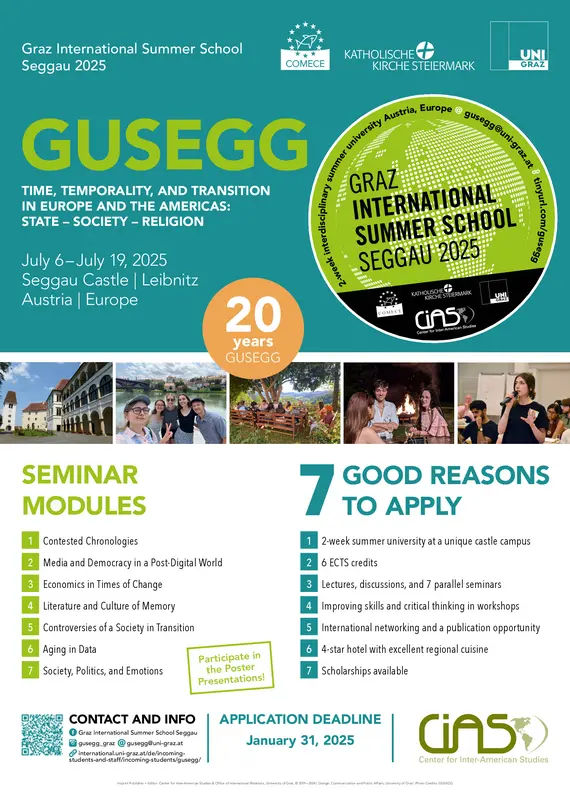Six Good Reasons to Apply
- 2-week summer university with a campus atmosphere at Seggau Castle
- Open to all students in the Master's programme English and American Studies (regular and Joint Programme)
- Credits can be recognised for participation and a seminar paper
- Lectures, panel discussions and 7 parallel seminar modules (small groups)
- Discussions and networking opportunities with international lecturers and guests
- All-inclusive-package (tuition, meals, accommodation, extra-curricular program and field trips)
- Develop skills in Public Speaking, Academic Writing, and Critical Thinking
About
"GUSEGG - Graz International Summer School Seggau" is designed for internationally oriented, highly motivated students from all disciplines, who wish to deepen their understanding of current European and international affairs by studying and discussing global developments and challenges within the context of transformation processes and demographic change reflecting aspects of individual, social, political, religious, cultural, literary, regional, economic, cohort and national identities.
With a complete European integration in mind, the summer school contributes to a better understanding on a European as well as international level. Thematic seminars in the respective fields allow students to strengthen their understanding of complex issues in their study areas. Cross-cultural teaming and transferable skills workshops add an important aspect to the summer school and give students the opportunity to acquire additional skills that will allow them to succeed on the international labour market and become cross-culturally competent experts.
The target groups for the summer school are highly motivated students following their studies at master level within the Joint Degree programmes or any other programme allowing for the recognition of the summer school courses within their study programme.The summer school is affiliated with the Joint Programme, thus Joint Programme students can have 6 ECTS recognised towarsd their mobility semester. Students of the regular track also have the opportunity to have credits recognised.
GUSEGG 2025: Time, Temporality, and Transition in Europe and the Americas: State – Society – Religion
Faced with a multitude of concrete challenges and crises posing existential threats to our lives and the stability of our societies, concrete implications of abstract concepts such as time and temporality are often less explored concerning their impact on the transitions we face. Despite the fact that no other notion has received as much attention as time, it is not a concept that is usually considered when discussing the relationship between the individual and the collective. Time has been considered epistemologically and ontologically in terms of present, past, and future, as breaks, pauses, and turning points, as continuity and change, eternity, and human mortality, as times of war or peace, in the context of commercial transactions, while political rule and functions, contracts, policies, and treaties have always been conceived of as time-independent. However, time itself has remained strangely underdefined. With modernity, the exact measuring and defining of time were introduced. Time and modernity are deeply intertwined concepts. Our lives are structured as progress narratives and expressed as assumed correlation between time and abilities. The rhythm of our individual as well as our collective lives are determined by measurement of times. From schedules to deadlines, temporal micro and macro dimensions determine our existence throughout our lives and even beyond. Temporality can be defined as the state of existing within or having some relationship with time. In light of this, we can say that modernity has thoroughly temporalized our lives. Being defined by one’s relationship to time, being exclusively within time without reference to something outside of it: that is part of the modern condition.
GUSEGG 2025 will offer a platform for the contributions of academics of various backgrounds and disciplines on the topic of time, temporality, and transition. This pluralism reflects the breadth and depth of the question posed by the title. Regardless of our positions, we are all determined by time. Thus, temporality as an expression of our relationship to time needs to be redefined not only individually but collectively in its past, present, and future implications.
Thus, GUSEGG 2025 will present research on how time, temporality, and transition in Europe and the Americas are addressed socially, politically, culturally, and economically, and what this means for states, societies, and religions. In order to develop strategies and methods to meet the challenges of our times, this summer school suggests engaging in academic contemplation and interdisciplinary exchange. Such investigations offer us the opportunity of developing intellectual approaches and ideas, as we can gain insights into the many forces that make us believe that the crises we face are essential, natural, or inevitable. Therefore, the suggested analysis offers us not only an understanding of our own positions on an individual, a regional, national, and global level but also the possibility of moving from a passive position to active involvement in addressing time, temporality, and transition offering insights into the dynamics and structures that govern and shape us as individuals and groups. Focusing on the emphasis areas of the University of Graz – South Eastern Europe and North, Central and South America – this program will offer a basis for discussing global and continental challenges as well as opportunities that such academic engagement provides.
Prof. Dr. Roberta Maierhofer,
Academic Director
The deadline for the call of papers is January 31, 2025. For more information please see the summer school's leaflet(711.5 KB)!

